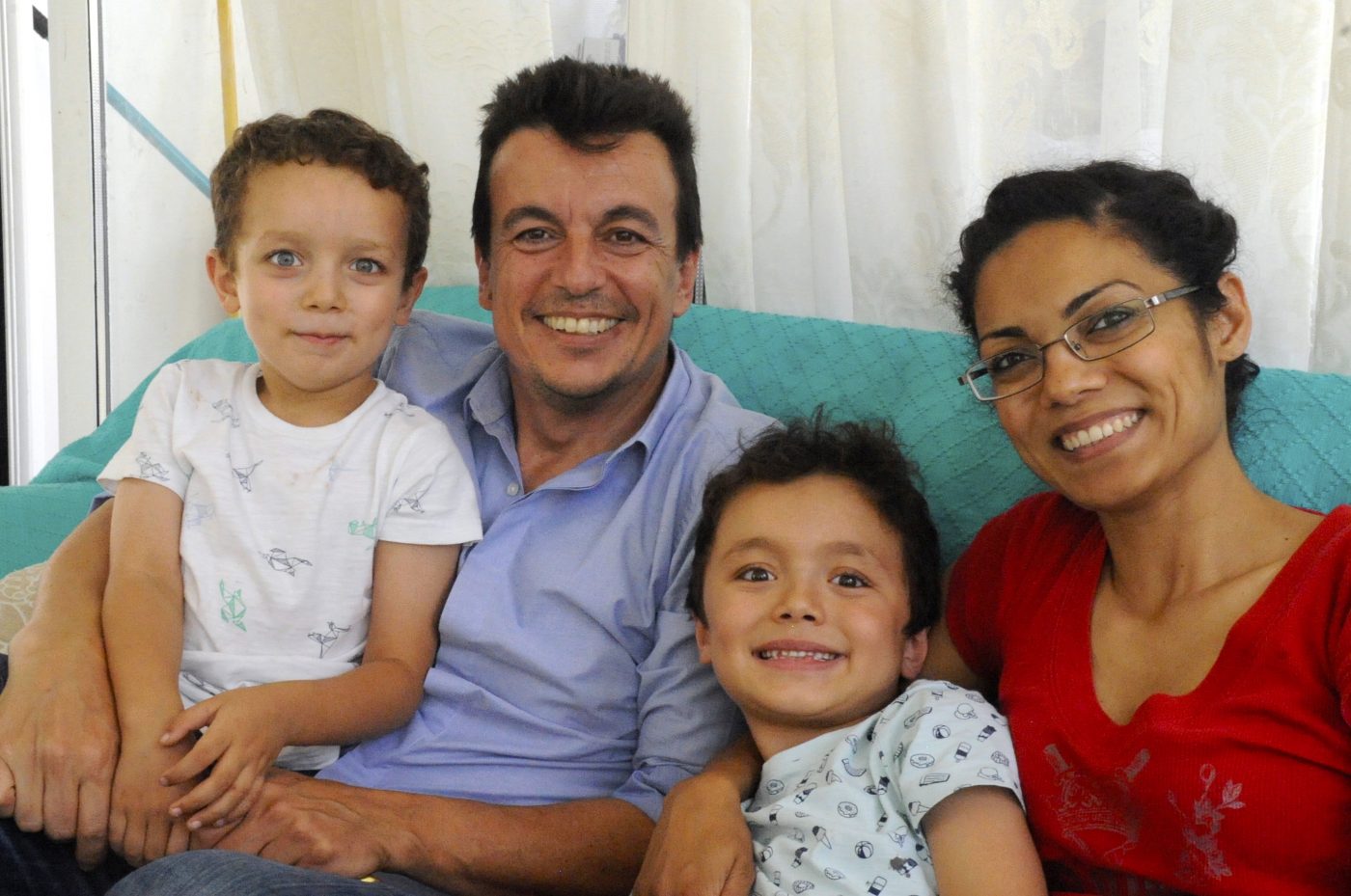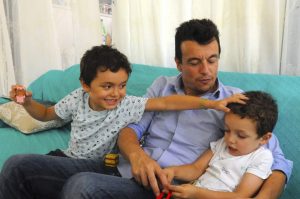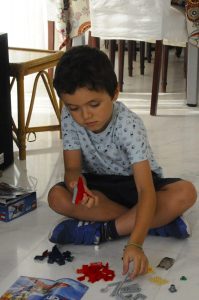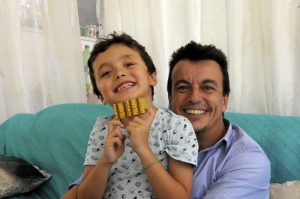In Greece, One Family’s Struggle with Duchenne
Written by |

Dimitrios Athanasiou, Omaira Gill and their two sons, Hector and Hermes. (Photo by Larry Luxner)
In the mythology of ancient Greece, Hermes was the god of boundaries and transitions, with the ability to move between the mortal and divine worlds.
In modern-day Athens, Hermes Christos Athanasiou Gill is a cheerful, trilingual 7-year-old who likes math and enjoys playing Minecraft, a video game. He also has Duchenne muscular dystrophy, a reality his parents — financial consultant Dimitrios Athanasiou and business journalist Omaira Gill — have struggled with ever since their boy’s diagnosis at 13 months of age.
“Until then, Hermes was healthy and always alert,” Gill told Muscular Dystrophy News Today during a visit to the family’s home in the southern suburb of Argiroupoli. “One day, he started vomiting water. He was crying, but there were no tears, so I took him to the hospital for gastroenteritis. He got over the virus in four days, but they wouldn’t let him out of the hospital.”
Gill said that’s because her son’s creatine kinase (CK) concentration, a blood measurement whose normal range is 39 to 308 units per liter, exceeded 20,000 — a telltale sign of Duchenne.
“When we got the news, it devastated me. I had dreams for my child, and it’s like my dreams died. I was on my own,” said Gill, 36, who now works from home writing for a Greek economic blog while caring for Hermes and his younger brother, Hector, who doesn’t have Duchenne. “We weren’t expecting this.”
Hermes’ diagnosis also converted Athanasiou from a successful consultant specializing in finance and business development into a Duchenne advocate at MDA Hellas — a Greek nonprofit organization that helps patients with neuromuscular diseases. He’s also on the board of the World Duchenne Organization and a member of the London-based European Medicines Agency’s pediatric committee.
“Your life as you knew it ends, and a new life starts,” said Athanasiou, 48. “It’s a very strong reality check of what’s important and what’s not. You lose some people because they feel uncomfortable. It’s not that they’re bad; they just can’t handle the pain that goes with it. I told my wife we were going to lose 30 to 50 percent of our friends, but it was a blessing because we gained better friends.”
He added: “After you survive the diagnosis, you don’t really care about anything else. You don’t have enough energy to spend on that. You depend on the kindness of strangers.”
‘As normal a life as possible’
At home, Hermes spends his days playing with his friends and his younger brother. Besides Greek, he speaks English and Urdu — the native language of his Pakistani mother — as well as a smattering of French and Italian. Twice a week, Hermes has 30-minute hydrotherapy sessions; also on his schedule are daily stretching exercises — for now, he’s kept away from computers and the internet.
“He has a lot of friends. He’s very social,” Anathasiou said. “But he has difficulties climbing stairs and walking long distances. He has problems with stamina and gets fatigued.”
Gill’s aim is to give both her sons as normal a life as possible.
“We have a diet that excludes salt and sugar for Hermes. I make cakes with honey,” she said. Hermes currently takes prednisolone and vitamin D, but nothing specifically for Duchenne.
Gill said her son knows he has muscular dystrophy, and that he’s gradually connecting the dots.
“We’ve told Hermes that his body is a little bit different, that he has weak legs,” she said. “He asked when he can stop taking his medicine, and we told him he’d have to take them for the rest of his life. Hermes hasn’t yet asked me if there’s a cure. But when that time comes, I’ll answer him in an honest way.”
According to studies Athanasiou has helped to conduct, each Duchenne patient costs the Greek healthcare system nearly €500,000 a year (about $585,000), since national health insurance covers all hospitalization, as well as outpatient care and all necessary therapies.
“Hermes is getting hydrotherapy, occupational therapy, and physiotherapy every week. It helps his heart and his breathing. This is the best thing they can do to keep him in the best possible condition for as long as we can,” he said. “We try to keep very low egos and focus on the result.”
Good business for some
From a strictly business point of view, he said, Duchenne interests pharmaceutical companies because they know it’s a profitable disease. Thanks to new therapies and better care, boys with Duchenne are now living into their late 20s, early 30s, and beyond.
In six countries alone — the U.S., France, Germany, Italy, Spain and the U.K. — the market for Duchenne therapies will reach a combined $1 billion in 2019, said Anathasiou, speaking at the recent 9th European Conference on Rare Diseases & Orphan Products in Vienna. That’s up from $8.2 million in 2014, representing a compound annual growth rate of 160.5 percent.
While this represents a bonanza for pharma companies, it also puts a burden on taxpayers who ultimately have to foot the bill for the families of children with the disease. That creates an even bigger need for effective therapies that cure the disease and minimize the burden to national health systems.
“If Duchenne boys now live 20 to 30 years, then the amount the health system has to invest in them is a lot more than when they lived to only one and a half years,” Athanasiou said. “The older you get in Duchenne, the more things you need.
“So if you’re a 6-year-old child, you don’t need a ventilator. But if you’re 26, you might need a ventilator, a feeder, pulmonary cardio management, and even a pacemaker. Each hospitalization last longer and you need more assistive devices. For this reason, curing the disease is essential — not only for patients but also for the sustainability of health systems.”
As the well-educated Duchenne community expands its influence in the global rare disease space, it’s also beginning to have more of a meaningful say in the design of clinical trials, both in the U.S. and Europe.
“We’re not ultra-rare, but neither are we a mainstream disease. We are something in the middle,” he said. “We do not get drugs approved by emotions. We get drugs approved by science, so we have to be more than emotional parents. We have to be professional, technocratic, and attentive to detail in order to really have an effect — because sometimes you never get a second chance.”
Meanwhile, Gill said she and her husband are planning a third child. As with Hector, she will have a prenatal screening at three months. Given that she’s not a carrier, her chances of giving birth to a second boy with Duchenne are quite small — she just wants to be on the safe side.
She’ll also never stop hoping for a cure.
“It’s the only thing that gets you out of bed,” she said, well aware that the prognosis for Hermes could have been much worse. “Despite our bad luck, we’re lucky it’s Duchenne. Somewhere, there’s a parent wishing they were me.”







